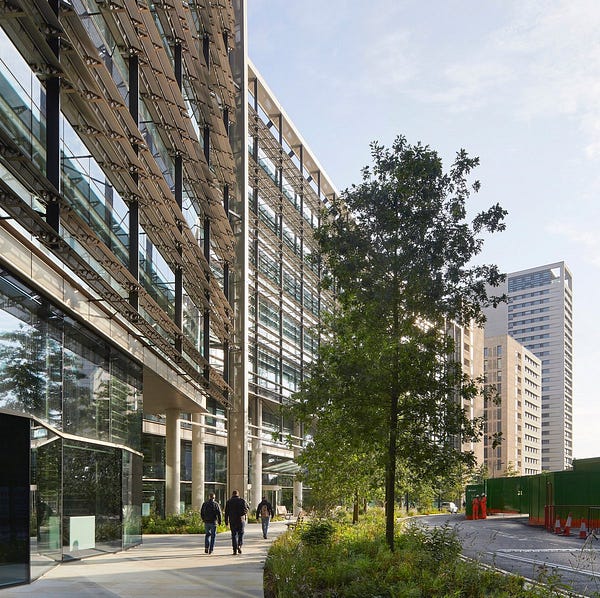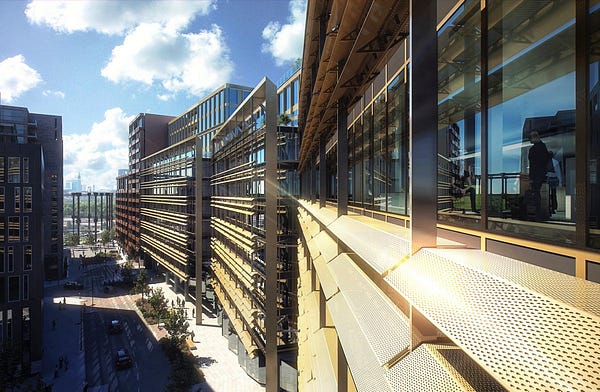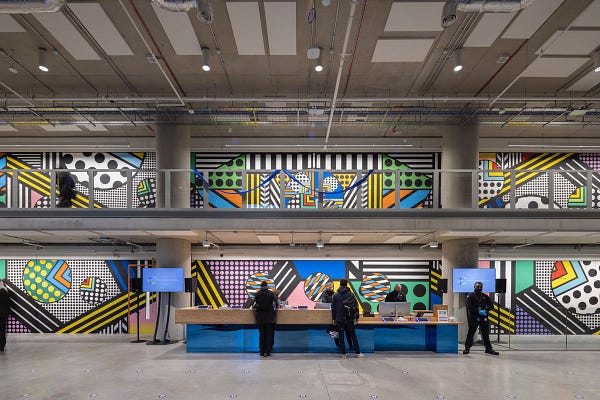The Weekly Distillation No.67
Offices; London; Covid; Hybrid Work Culture; War; News Cycles; Deep Work

This newsletter is written for entrepreneurial leaders who want to learn about the moment we are living in but don’t have time to read broadly; who want to grasp the key themes; and who want to create better ways of advancing their mission. The Weekly Distillation covers a broad range of topics with the intent to curate the key narratives of the week, how they fit the broader themes of society and to pose questions that help you to think deeper on the application in your context. You can read more about the key themes I see here.
People once said……..
"Case rates here in the UK are really, really high and hospitalisations in London, for example, are becoming exceptionally high again. And what keeps me awake at night is whether the people we have called - over-75s - for their second booster dose are going to come forward really rapidly and really quickly in the next few days and weeks, because it is going to be important." - Prof Sir Jonathan Van-Tam, England's deputy Chief Medical Officer
“Money and success don't change people; they merely amplify what is already there.” - Will Smith
"All these people were shot, killed, in the back of the head," Anatoly Fedoruk, Mayor of Bucha, Ukraine in a town that Russian forces have left and amidst videos of people shot in the back of their head with hands tied behind their back
“Every man dies. Not every man really lives.” - William Wallace
“What information consumes is rather obvious: it consumes the attention of its recipients. Hence a wealth of information creates a poverty of attention, and a need to allocate that attention efficiently among the overabundance of information sources that might consume it.” - Herbert A. Simon
Skim it in a minute
How is that ‘new normal’ for you?
We are in an era of extreme Covid infections again, which unsurprisingly is leading to greater hospital admissions - and hence perfectly valid concern for the elderly and vulnerable. There are mild differences between England (no restrictions at all) and Scotland (the last remaining legal restriction of wearing masks extended to April 18th) but in essence, both Governments have said Covid is basically over and let’s move on with life. And in some ways they are right - the infections are mild, voluntary self-isolation is working as far as I can see amongst my circles, and the economy and our mental health needed an end to the uncertainty. However, it must be pretty terrifying right now if you are vulnerable.
I have spent a lot of the last week travelling to different parts of Scotland and London, visiting clients and potential clients. What I noticed - London is very very quiet. I got a seat on the Tube at 5.45 pm on a weekday - that’s an unheard-of experience, normally you can hardly even get on the Tube at that time of day. No queues in shops, very few cars and the streets were pretty light foot traffic as I walked around. People were back in offices - but obviously not completely. Even tourist traffic seemed lighter than normal.

We’re now well into the ‘new normal’ of hybrid working. Stats show that office occupancy remains much lower than pre-pandemic. I have heard anecdotes of 2000 person offices being a hollow shell of just a handful of people.
And yet Facebook just opened a massive new office in King’s Cross in London. Strange.





What we know is this - you can build better relationships with colleagues and potential clients when you see them in person; you can’t do good collaboration and brainstorming without being in the same room; you have to work harder and be more explicit in building peace when misunderstandings arise.
We also know that we are more efficient at home; that global distance shrinks when we use Zoom; that commuting was over-rated and a waste of time; that the flexibility that hybrid working offers is what most people want and is good for our mental health; that workers keep working into the evening and that people can then work on side-projects more easily (which I think leads to a vast rise in creativity).
We’re also seeing relationships start to crack, as the distance leads to less connection and this makes it easier to move to a new job, along with a very tight job market (hence the Great Resignation).
Those that lead need to accept the old way isn’t coming back - but just because you can’t see your team, it doesn’t mean that your team isn’t working harder than ever. The role of the leader is 1) now, more than ever, casting vision well and regularly 2) creating spaces and frameworks for collaboration on a regular basis and 3) building culture and values. In smaller teams that leader role will expand to include more functional tasks but those are secondary.
Are you ready for Work From Anywhere yet? That is the obvious next iteration of WFH. Why not work from an Air BnB?
What happens when parents realise the only thing restricting them from this life of ‘freedom’ is school terms? And yet - a life of permanent WFA is lacking. It lacks in rootedness, in relationship, in a sense of place and belonging - which hurts our mental health when we have no-one to turn to in the harder times, it gives a sense of placelessness and it can encourage a belief that life will be better just around the corner - which as we’ve seen in the 2020’s isn’t always true. I’ve been hybrid working since 2008 (and 2015 more formally) and it definitely has its pros and cons.
If you’re a leader that wants to go back to thrive in this hybrid working, the number one challenge you have is not productivity but actually people. Retention, morale, training, boundaries, culture, values, honesty, character. I want to hire self-starters, with great integrity and creativity, discipline and high EQ. I’m less interested in technical competency, experience and the legacy brands on your CV.
Are you returning to the office? Have you intentionally made a plan for a new hybrid work pattern? Who on your team is not getting the choice to work in a hybrid fashion? What do you do with the people who thrive in face to face and hate remote working? What might WFA look like for your organisation and team? What recruitment tools and processes can you use to identify people who have the right character for the new era? Why are you taking another year to move to a radical way of working going forwards? Can you honestly say that if you were starting afresh, you would design the pattern you have got now?
The long war?
Last week the press in my country were writing the war in Ukraine up as if it was over. This has been reflected in the headlines this week, where Will Smith and Gas prices have been more important than the war at points. A quick recap on some of the headlines that didn’t get a lot of noise (alongside the very obvious repositioning of Russian troops)
Mariupol is on the verge of being fully taken by Russian forces (bar some ‘mopping up’ where they hunt down Ukrainian troops)
Tanks are being sent South in Belarus
More troops are being sent from Georgia (South Ossetia) as well as more mercs
Peace talks are not making much progress
China has potentially been actively involved in cyber attacks on Ukraine
India has bought a lot of oil from Russia, giving the necessary cash that Russia needs
It doesn’t feel like the end. It feels like a new phase of what is either heading to an uneasy peace (with ongoing attacks at points, as we’ve seen in Eastern Ukraine for years now) or a long war of attrition. The risk of significant escalation into Western Europe remains real, mostly through misread intentions rather than any strategy.
The US and the UK supplying weapons may be both a strategically sensible move but also is very much in self-interest, given the factories that make these weapons are domestic - leading to secure jobs, a stronger defence industry and greater tax revenue. If the US can convince Eastern Europe to supply their weapons (anti-air systems, tanks, jets) to Ukraine, then they can then supply those too - thus increasing the domestic defence industry’s order book even further. Call me cynical?
We’re now fighting what we saw in Afghanistan and Iraq - the inability of the Western mind to focus on an issue for very long at all. This article by Mark Manson (ignore the unnecessary swearing) summed up the Western world’s news cycles in a social media era relatively accurately. When we go from war to cost of living to the Royal Family’s latest issue to Will Smith to #partygate…..is it any wonder we can’t work out which ones matter and which ones don’t? One that hasn’t been getting a lot of headlines is the war in Yemen - where a two-month truce, brokered by the UN, was announced this week - great news if it sticks.
As a leader of an organisation it is easy to get sucked into reacting to the latest outrage. It’s easy to put out a bland statement or social media post affirming your solidarity (not always a bad thing to do). But what does it look like to do the hard work? To find out the real issues. To reflect deeply on the meaning and future impact, and to imagine what a better world would look like if the bad was gone and more good was created? To be there in the short term AND the long term. That’s counter-cultural leadership and it will cost you. But that’s what brings about change.
How will you stand against Russian aggression now AND for the long term? Do you believe we should strengthen our military, or move to non-alignment? Do you want to pay higher taxes to fund that military build up? Are you going to shift your sourcing and personal purchases from China if it backs Russia in Ukraine? Are you prepared to pay more for goods and services if you do that? What opportunities might there be in Africa to shift sourcing and utilise the vast continent of youth, where unemployment remains a significant issue despite the growing economies?
Thanks for reading. Last week’s newsletter received 428 views with a 68% open rate and the number of subscribers is now at 236. I’ve been juggling what feels like a million moving parts of work this last week. I have 24 hours of calls or meetings booked in for next week already, which likely will double due to last-minute meetings and pre-meeting and post-meeting calls to brief and debrief. When you spend 48 hours in meetings, it doesn’t leave a lot of time to read, reflect, write, create or analyse - so I’ve found myself back to working more evenings again.
I’m not complaining, I enjoy the work that I get to do and it’s a joy to help the people that I get to help - but there’s an ongoing battle to find/make space to do deep work (HT Cal Newport), to reflect and to create. I’m reminded of Greg McKeown’s Essentialism and that key message of choosing best over good.
All of this reminds me why I love the practice of taking one day a week to switch off my phone, email, access to the internet and work in general and then allow my mind and body to rest and restore themselves. Hope you find some rest this weekend.







Thanks again for creating these summaries, it's great what you do and help us to reflect. Take care of yourself too, don't burn out!